It's unsurprising since the game received near-universal acclaim upon its release back in September.
What is surprising, though, is the size of Ubisoft's App Store portfolio. To date, the company has released 45 apps for iOS, and while many of these are companion apps rather than games, it's clear that the company's very keen to break into mobile.
As such, we felt the time was right for a rummage through Ubisoft's back catalogue, charting its first steps into a new market as well as taking a look at the chart performance of this year's game of the year.
Doing a runner
Rayman Jungle Run got off to a strong start, climbing to #2 in the top paid games chart before beginning to slide through the rankings.
It's worth noting that the game launched with $2.99 price tag, but early adopters were seemingly unperturbed by its relatively high price tag.
However, the game's lack of in-app purchases meant that it didn't climb quite as high in the App Store's grossing charts. In the days following its launch, Jungle Run peaked at #13 in the top grossing games chart, before revenue began to trail off.
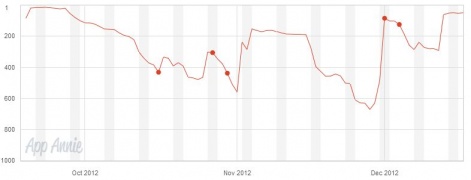
Rayman Jungle Run's performance in the US App Store's top grossing games chart. Analytics data courtesy of App Annie.
Since then, Ubisoft has kept Jungle Run in the grossing charts with occasional price cuts and fairly regular updates. One such update introduced the game's only in-app purchase a character unlock that can be purchased for 99c.
Rayman Jungle Run has generated considerable praise, then, but its monetisation mechanics have held the game back. As such, it consistently charts lower in the grossing charts than it does in the top paid apps chart.
History repeating
Rayman isn't the only console property that Ubisoft has brought to mobile. It's also attempted the same trick with Prince of Persia. Twice.
Launched in May 2010, Prince of Persia Retro is an adaptation of the original Prince of Persia game armed with a 99c price tag.
The game rose to #10 in the top games chart at release, and peaked at #38 in the top grossing games chart. With few updates, no IAPs and no price changes, PoP Retro had nowhere to go but down, and the game quickly slid out of the charts.
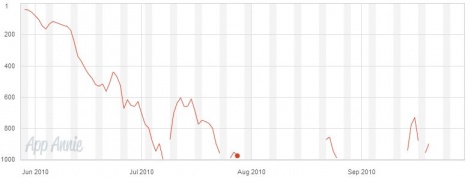
Graph showing Prince of Persia Retro's early performance (May-Sept 2010) in the US App Store's top grossing charts.
More recently, Ubisoft had a second stab at bringing the franchise to mobile, in the form of Prince of Persia Classic.
Once again, this is a mobile adaptation of the original game, although this time, Ubisoft reworked the graphics significantly and introduced a number of in-app purchases.
While Prince of Persia Classic maintained a longer tail of downloads, its grossing chart performance was even worse than its predecessor. Peaking at #160 in the top grossing games chart, PoP Classic lasted just over two weeks before dropping out of the top 1000 altogether.
The big guns
Ubisoft's biggest license, however, is undoubtedly Assassin's Creed, and the company has made several attempts to spread some of the series' success onto mobile.
The most recent fruits of this labour are Assassin's Creed Rearmed and Assassin's Creed Recollection.
Rearmed is a freemium multiplayer title released in October 2011. At launch, the game reached #10 in the top free games chart, and subsequent updates produced download spikes that propelled the game back into the upper echelons of the App Store rankings.
However, its grossing performance was relatively poor, and Rearmed peaked at #324 in the US App Store's top grossing games chart before quickly dropping out of the top 1000.
Recollection launched only a few months behind Rearmed, but carried a $2.99 price tag. In March 2012, the game was made permanently free, but by this point, Assassin's Creed Recollection was already sunk. It peaked at #360 in the grossing games chart.
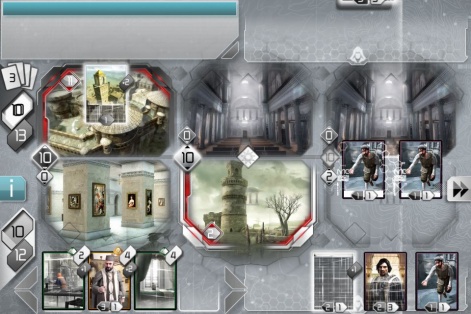
Assassin's Creed Recollection made no attempt to recreate the series impressive visuals or open world gameplay.
Race against time
But while Ubisoft struggled to make much of its flagship franchises, wholly-owned subsidiary Red Lynx has had better luck adapting its brand of '2D trials' gameplay for mobile.
MotoHeroz was the result, and at launch it broke into the top 10 paid games chart for iPhone.
Although it was no smash success, MotoHeroz reached #48 in the US App Store's top grossing games chart no doubt buoyed by a number of in-app purchasing options and judicious price cuts kept MotoHeroz in the download rankings for some time, too.
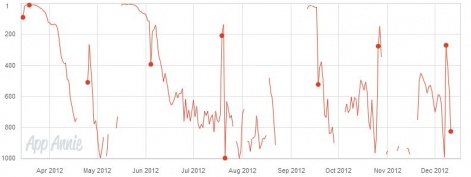
MotoHeroz's performance in the US App Store's downloads chart. Note the download spikes caused by periodic price drops.
What's the lesson to be learnt, then? Well, one takeaway seems to be that a big license is no guarantee of a big hit. Although licensed games tend to ride high in the App Store charts, that clearly isn't to say that they're sure-fire home-runs.
Perhaps the problem is that big name gaming properties attract a certain type of player, and create a certain set of expectations. Assassin's Creed is known for huge, graphically detailed open worlds, after all, not visually plain 'real-time board games'.
Rayman Jungle Run, on the other hand, offers visuals that rival those of its sumptuous console sibling, and gameplay that's tailored to mobile.
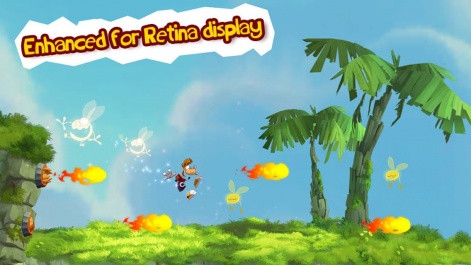
As such, perhaps the conclusion to be drawn is that established gaming names must be handled with care.
And if you're planning on bringing a big name to mobile, it makes sense to play to the series' established strengths, something Ubisoft's Sophie Pendaries spoke candidly about at the recent Mobile Gaming Europe conference.
We look forward to Ubisoft and GREE's forthcoming Assassin's Creed: Utopia with considerable interest.






















